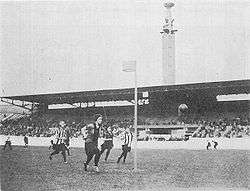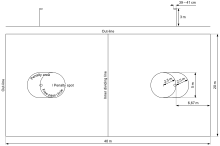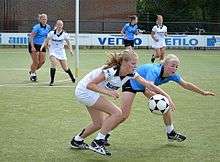Korfball
Korfball (Dutch: korfbal) is a ball sport, with similarities to netball and basketball. It is played by two teams of eight players with four female players and four male players in each team. The objective is to throw a ball into a netless basket that is mounted on a 3.5 m (11.5 feet) high pole.
Outdoor korfball match in the Netherlands | |
| Highest governing body | International Korfball Federation |
|---|---|
| First played | 1902 |
| Characteristics | |
| Contact | Limited |
| Team members | 8 per side: 4 male players and 4 female players |
| Mixed gender | Yes |
| Type | Team sport, ball sport |
| Equipment | Korfball |
| Venue | Korfball court |
| Presence | |
| Olympic | Demonstration sport in 1920 and 1928 |
| World Games | 1985–present |
The sport was invented by Dutch school teacher Nico Broekhuysen in 1902. In the Netherlands, there are approximately 500 clubs and more than 90,000 people playing korfball. The sport is also played in Belgium and Taiwan, and in nearly 70 other countries.
History

In 1902 Nico Broekhuysen, a Dutch school teacher from Amsterdam, was sent to Nääs, a town in Sweden, to follow an educational course about teaching gymnastics to children. This is where he was introduced to the Swedish game "ringboll". In ringboll one could score points by throwing the ball through a ring that was attached to a 3 m pole. Men and women played together, and the field was divided into three zones. Players could not leave their zone.[1][2]
Broekhuysen was inspired; and when he returned to Amsterdam he decided to teach his students a similar game. He replaced the ring with a basket (for which the Dutch word is Korf or mand), so it was easier to see whether or not a player had scored. Broekhuysen also simplified the rules so that children could also understand and play the game. Thus korfball was born. The main idea was the same as ringboll, but the new sport now stood on its own.
The oldest still existing korfball club to never have merged with any other club is a Dutch korfball club H.K.C. ALO from The Hague, Netherlands. H.K.C. ALO was founded on 1 February 1906.
At first, there was considerable controversy about the sport, because the players were of both sexes. Several sports journalists refused to pay even the slightest attention to the new sport. Korfball players were accused of being immoral. Even the sportswear was criticised, because the women were showing bare knees and ankles; one newspaper wrote that "Korfball is a monster that spreads its claws to all sides."[3] Yet korfball was featured as a demonstration sport in the Summer Olympics of 1920 and 1928.[4]
The International Korfball Federation was founded in 1933 in Antwerp, Belgium.
Korfball is played in 69 countries including the United States, China, England, Scotland, Ireland, Wales, Australia, New Zealand, Czech Republic, Slovakia, Poland, Ukraine, Greece, Serbia, South Africa, Zimbabwe, India, The Netherlands, Belgium, Nigeria, Morocco, Ghana, Russia, Germany, Taiwan, Turkey, Hong Kong, Portugal, Pakistan, India, Sweden, Hungary, Philippines, Indonesia, Italy, Spain, France and Romania. It is growing in popularity in the U.K., and is referenced in a song by the band Half Man Half Biscuit entitled "Joy in Leeuwarden (We Are Ready)" on their 2011 album 90 Bisodol (Crimond).
Korfball has been played in the World Games since 1985. IKF World Korfball Championships have been held every four years since 1978. The leading nations are the Netherlands, Chinese Taipei, and Belgium.
Hong Kong hosted its first international tournament, the IKF Asia Oceania Korfball Championship, in 2006. New Zealand hosted the IKF Asia Oceania Youth Korfball Championships in 2007.
Rules and regulations
Equipment

Korfball is played inside in winter and outdoors in spring and autumn.
The size of the indoor court is 20 m × 40 m (22 yd × 44 yd), as are most outdoor courts. The court is divided into halves called zones. In each zone is a 3.5 m (11 ft) tall post with a basket at the top. This is positioned two-thirds of the distance between the center line and the back of the zone.[2]
Team
A korfball team consists of eight players: four female and four male.[5]
Match

An international korfball match typically consists of two (2) halves or four (4) periods, with the length varying depending on the competition. When the match consists of halves, the duration is typically 25 minutes, with periods typically between 7 and 10 minutes, with a one-minute break between the first and second periods and between the third and fourth periods. At half time the break is five or ten minutes.[5]
Four players of each team are in one zone and the other four are in the other zone. Within each zone, a player may only defend a member of the opposite team of the same gender.
At the beginning of the match, one team chooses a particular half of the court. That half will be that team's defending zone, with "their" basket in it. Players score by throwing the ball through the opposing team's basket. After two goals, the teams change zones: defenders become attackers and attackers become defenders. In between those zone-changes, attackers cannot set foot on their defending zone or vice versa. At half time the teams swap halves of the court.
The rules prevent physical strength dominating the game. Blocking, tackling, and holding are not allowed, nor is kicking the ball.
Once a player has the ball, that player cannot dribble or walk with it; however, the player can move one foot as long as the foot on which the player landed when catching the ball stays in the same spot. Therefore, tactical and efficient teamwork is required, because players need each other in order to keep the ball moving.
A player may not attempt to score when defended, which occurs when the defender is in between the opponent and the basket, is facing his/her opponent, or is within arm's length and attempting to block the ball. This rule encourages fast movement while also limiting the impact of players' height compared to their opponents.
International tournaments
World Games
The national teams competition organized by the International World Games Association has been played roughly every four years since 1981.
| Year | Host | Champion | Second place | Third place | |
|---|---|---|---|---|---|
| II Details | 1985 | United Kingdom | |||
| III Details | 1989 | Germany | |||
| IV Details | 1993 | Netherlands | |||
| V Details | 1997 | Finland | |||
| VI Details | 2001 | Japan | |||
| VII Details | 2005 | Germany | |||
| VIII Details | 2009 | Taiwan | |||
| VIII Details | 2013 | Colombia | |||
| IX Details | 2017 | Poland | |||
| X Details | 2021 | United States |
IKF World Korfball Championship
The national teams competition organized by the International Korfball Federation has been played roughly every four years since 1978.
| Year | Host | Champion | Second place | Third place | |
|---|---|---|---|---|---|
| I Details | 1978 | Netherlands | |||
| II Details | 1984 | Belgium | |||
| III Details | 1987 | Netherlands | |||
| IV Details | 1991 | Belgium | |||
| V Details | 1995 | India | |||
| VI Details | 1999 | Australia | |||
| VII Details | 2003 | Netherlands | |||
| VIII Details | 2007 | Czech Republic | |||
| IX Details | 2011 | China | |||
| X Details | 2015 | Belgium | |||
| XI Details | 2019 | South Africa |
IKF U23 World Korfball Championship
Continental championships
IKF promotes four continental championships: European Korfball Championship, All-Africa Korfball Championship, Pan-American Korfball Championship and Asia-Oceania Korfball Championship.
Europa Cup for Clubs
Every year the IKF organises the Europa Cup for national champions (clubs). The Europa Cup was organized for the first time in 1967, and was won by Ons Eibernest from the Netherlands. The winner of the last edition was TOP/SolarCompleet, which also won in 2017.
PKC from Papendrecht, the Netherlands, have won the championship the most times, a record 12 wins in total.
Until now, the winning team was either from the Netherlands or Belgium, with respectively 45 and 6 Europa Cups. The only club from the United Kingdom to reach the final was Mitcham Korfball Club from London. Mitcham lost the final against Catbavrienden from Belgium in 1998.
Beach korfball
For beach korfball, the rules of the game differ slightly from those of regular korfball. Each team has 4 starters and 2 substitutes. The field of play is 20 metres by 10 metres, and goals are to be placed 4 metres from the end line. Matches consist of two halves of 6 minutes with a 1-minute rest.
Each team has a total of 4 players in the field, two men and two women. Players can be substituted at any time. Furthermore, if a goal is scored from a 2-point zone, a two-point goal is awarded. Free shots can both be executed at the standard Free Shot line, or at the spot where the fault was made by the opponent.
The current European beach korfball champion is Portugal, who won the IKF Beach Korfball World Cup (Europe) 2019. Belgium claimed victory in the U19 division.[6]
Cultural references
Korfball is the theme of the song "Joy in Leeuwarden (We Are Ready)" on the album 90 Bisodol (Crimond) by Half Man Half Biscuit.
See also
References
- Koninklijk Nederlands Korfbalverbond. "History of korfball" (in Dutch). Archived from the original on 17 December 2010. Retrieved 4 February 2011.
- "korfball". Webster's Sports Dictionary. Springfield, Mass.: G&G Merriam Company. 1976. p. 248.
- "Sports On Call - Information You Can Access On One Call". Retrieved 1 February 2019.
- Jurryt van de Vooren. "Forgotten Sport-heroes: Nico Broekhuysen" (in Dutch). Retrieved 4 February 2011.
- IKF. "Complete Rules of Korfball" (PDF). Archived from the original (PDF) on 4 March 2016. Retrieved 10 October 2015.
- "Results". IKF BKWC 2019 Bonson. Retrieved 17 June 2020.
External links
| Wikimedia Commons has media related to Korfball. |
- International Korfball Federation (IKF) includes rules, all national associations and event results.
- "Homepage". Royal Dutch Korfball Association. Archived from the original on 18 December 2010. Retrieved 6 February 2011. (793.7 KB) Extensive description and explanation of rules and requirements in competition korfball. (in Dutch)
- Infographic about what korfball is